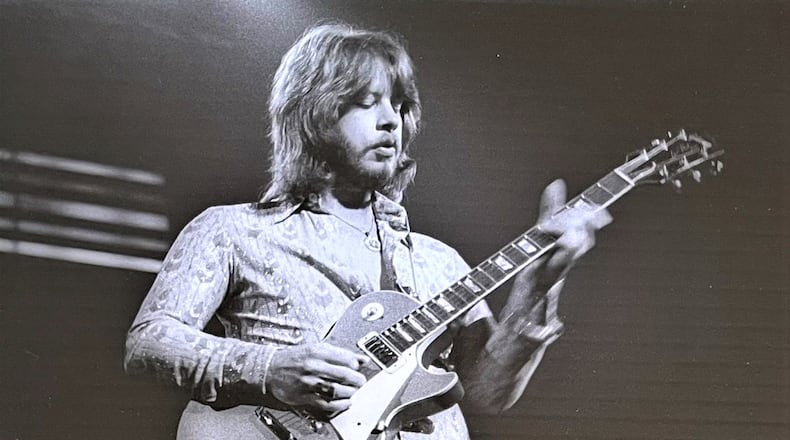Before he was lead guitarist for the Atlanta Rhythm Section, Barry Bailey was an unknown session player in Atlanta. Once, when a session was over and Bailey was leaving, legendary music producer Buddy Buie called out “Barry, you left something behind.” Bailey asked what he had forgotten, and Buie replied, “You left your ass behind. You played it off.”
Founded in Doraville in 1970 by Bailey and others, the Atlanta Rhythm Section had a string of gold and platinum albums in the ‘70s, and hits including “So Into You,” “Champagne Jam,” “Imaginary Lover,” and “I’m Not Gonna Let It Bother Me Tonight.”
In just a few months in 1978, the band played the Knebworth Festival in England, played a White House birthday concert for Jimmy Carter’s son Chip (the band had campaigned for Carter’s 1976 presidential run), and headlined the all-day Champagne Jam rock festival at Georgia Tech’s Grant Field, with opening acts Santana and the Doobie Brothers.
Barry Bailey died March 12, 2022, at his home in Madison, Georgia, from complications of multiple sclerosis. He was 73.
Friends and colleagues uniformly recalled Bailey with the same non-rock star adjectives: analytical, down-to-earth, organized, dependable, humble. And quiet, everyone agreed.
“I used to half laughingly say I’d never heard him say a paragraph,” said the band’s lead singer Rodney Justo.
“There’s rock stars and there’s musicians. He was a musician,” said Willie G. Moseley, author of “The Atlanta Rhythm Section: The Authorized History.”
“Barry was very meticulous about serving the song,” he continued. “He would go over the songs and find certain riffs. Even for concerts, he would find certain locations on the stage where he could stand that would be sonically optimal. He had that good of an ear, and he was that committed to his music.”
While some guitarists collect multiple instruments, Bailey always stuck with one favorite: a 1969 Gibson Les Paul Goldtop Deluxe.
“He was the guy that everybody watched when he took a solo. And those solos, night after night, just soared off into the stratosphere,” said Tony Paris, a former road manager for the band.
Bill King, who covered music for The Atlanta Constitution from 1976-’86, recalled: “One night in 1977, I sat in their studio in Doraville, watching him methodically work out the guitar part for ‘I’m Not Gonna Let It Bother Me Tonight.’ After a while, Buddy Buie suggested he and I go to a nearby diner to chat. Pointing to Barry, he said, ‘He’ll be at this for quite a while.’ Sure enough, when we returned to the studio, Barry was still at it.”
ARS used a melodic pop songwriting base as a springboard to dabble in country, jazz and blues, and never really fit into the Southern rock label they were often assigned.
“They got lumped into the Southern rock thing ‘cause they were in the South and they played rock music,” said Mark Pucci, the band’s publicist in the early ‘80s. “But Barry’s guitar playing was very different from Southern rock guitar players. He was influenced by the British players, by Eric Clapton and Peter Green. He was able to play a lot of different styles.”
Barry Bailey was born June 12, 1948, in Atlanta, and grew up in Decatur. He received his first guitar, a Sears Silvertone, from his parents when he was 11, according to his sister Myra Bailey Kay. By the time he was 12 he was teaching friends to play, and soon started playing in small bands.
He married his high school sweetheart Dawn Vanderlip in 1968. They later built a home in Madison, which included a large menagerie of animals.
In 2005, Bailey was diagnosed with multiple sclerosis, an unpredictable disease that attacks the central nervous system.
“It got to the point at concerts where he was sitting down on stage on a stool playing,” recalled Rodney Mills, recording engineer and co-designer of Doraville’s Studio One, the home of the band for years. “He made the decision to pull the plug on his live performances.”
In 2006 his wife Dawn was diagnosed with aggressive lung cancer and Bailey retired from the band to care for her and manage his own. Dawn died later that year.
“He really took care of her with such dignity and such faithfulness until the very end,” said his niece Jennifer Self.
After his diagnosis and Dawn’s death, he was determined to live as independently as he could, said Moseley.
“…he wanted people to come over and enjoy time together,” Self said.
ARS has continued to tour, with various musicians, and played its first show since Bailey’s death on Friday, March 18, in Woodstock, Georgia.
“People talk about influencers being a big deal now,” Justo told the audience. “Barry was an influencer. If you played guitar and you heard Barry play, you wanted to play like Barry. … Barry put up a hell of a fight. He had MS. He fought it for 17 years. But it was a fight he couldn’t win.”
Bailey is survived by his sisters Bev Bailey of Brookhaven and Myra Bailey Kay, of Jacksonville, Florida, and several nieces and great nieces.
Arrangements are being handled by A.E. Carter Funeral Home in Madison, Georgia. A memorial will be held at a later date. Bailey requested that donations be made to Shepherd Center and Nuci’s Space, an Athens non-profit resource center for musicians.
About the Author
Keep Reading
The Latest
Featured

